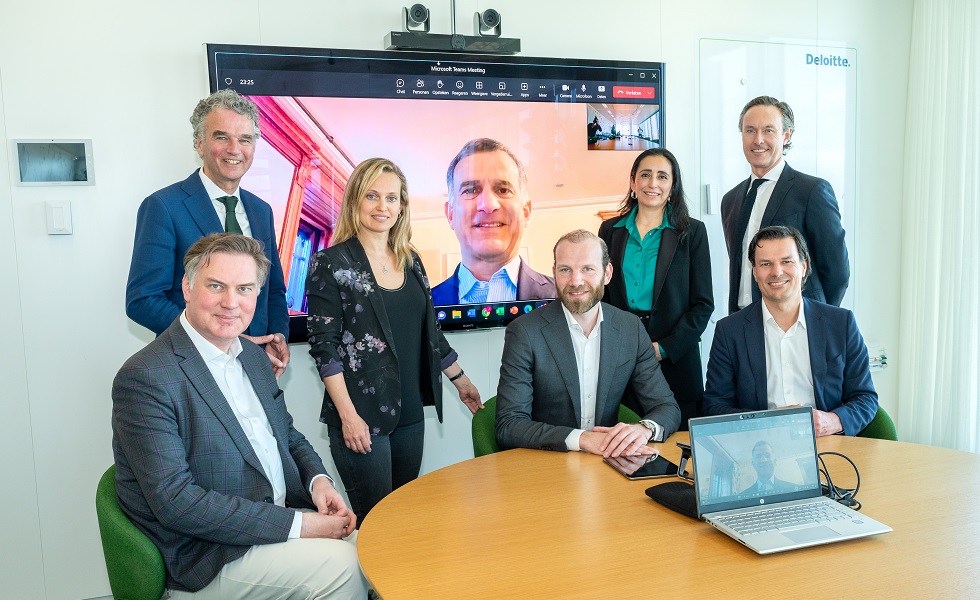Roundtable 'From Fossil Fuels to Renewable Energy'

This report was written in Dutch. This article is an English translation.
There are enormous opportunities in the energy transition. The participants in the Roundtable on fossil fuels versus renewable energy were in complete agreement. In one of the most sustainable buildings in the Netherlands, The Edge in Amsterdam, they came to the following conclusion: the investment opportunities for renewable energy are getting better and better.
By Ronald Bruins
|
Moderator:
Participants:
|
Moderator Don Gerritsen, Director and Responsible Investment Leader at Deloitte, kicks off. He likes to hear the big picture from the participants in the Round Table. How do they view fossil versus renewable energy? 'We see a lot of new regulation, a lot of net-zero ambitions from companies with and without intermediate targets until 2030 or 2050, and also divestments from fossil fuels. What are your considerations on this subject?'
Over a video link, Pete Labbat replies, 'From renewable energy infrastructure, including solar and wind farms, to carbon capture, recycling and circular economies, we've seen North America's investment opportunities for renewable energy just get better, boosted by the recent US government tax incentives included in the Inflation Reduction Act. They stimulate this energy transition enormously and as a result we are now experiencing an acceleration.'
|
Don Gerritsen Don Gerritsen has been Director and Responsible Investment Leader at Deloitte since 2022. Prior to that, he held various senior positions at the PRI, UN and KPMG in the US, UK, Kenya and the Netherlands. He is the author of Guidance to Inspirational Leadership and Founder of the pro-bono mentoring initiative Pay It Forward. Gerritsen has an Executive MBA in Strategy and a Master in Public Administration. |
Another investment case?
Angeles Toledo responds on behalf of Blue Sky Group: 'We want to help make the transition from fossil to renewable energy possible. It is an important investment case, but the transition itself is not that simple. I want to put on the table that unfortunately the world is still very dependent on fossil fuels and the solutions for a scalable, rapid decarbonisation of the most polluting sectors - agriculture, steel, cement and transport - do not yet exist. That is why we need everyone for the transition: investors, governments, companies and consumers.'
Mark van Baal, whose organization is known for its long-term activism during shareholder meetings, responds: 'Net zero in 2050 is too non-committal. Climate scientists who made the IPCC reports don't give us that much time. It is also too easy to stick to 2050. Then we will all be retired. I'll be in my eighties then. The bar for companies must be higher.'
Arij van Berkel draws attention to the importance of a thorough analysis in the renewable energy market. 'In addition, there must also be an analysis of the tax incentives that governments offer. If these disappear, will the technology survive? Is it still an investment case? Government support should help pull the technology through the valley of death.'
If tax incentives fall, will the technology survive? Is it still an investment case? Government support should help pull the technology through the valley of death.
2030 is very close
Olena Reznik is part of an investment team that looks at business cases in the energy transition on a daily basis. “It is one of the oldest teams in this field and we manage one of the largest funds in renewable energy. I think it's important that we have clear priorities on this topic and build momentum. Because 2030 is very close. So what should we do to achieve the ambition? And what should we do first?”
In the Paris Climate Agreement, 195 countries have agreed to limit the rise in average global temperature to well below 2°C by 2050 and, if possible, to 1.5°C. Companies themselves often have a derived objective from this. For example net zero. An organization's total greenhouse gas emissions are less than or equal to the emissions it removes from the atmosphere.
Gerritsen: 'To net zero within seventeen years, as some financial institutions have set the target, is ambitious.' Mark Gilligan: 'In addition, we have to make the transition to renewable energy together with society. In such a way that we get people on board and there is no social unrest. That is a challenge in itself.”
|
Mark van Baal Mark van Baal founded Follow This in 2015, a group of more than 9,000 green shareholders in Big Oil. Their mission is to enable shareholders to get oil and gas companies to reduce their emissions in line with the Paris Climate Agreement. Van Baal studied mechanical engineering and was an energy journalist, among other things. |
Real impact
As an investor, Marc Hutten wants to go for real impact in the real economy, in the field of climate change and the energy transition, instead of cosmetic interventions in investment portfolios. 'How you do that is the question. Through indirect or direct markets? Are you going for an engagement strategy or an inclusive approach? I notice that pension funds are struggling with such questions and are looking for how they can shape the change in concrete terms.'
Hutten also objects to the label 'fossil company'. 'We're not just talking about oil companies. Every company must make the transition to 100% renewable energy and renewable materials. If we want to get inspired, we can look at DSM. The letters stand for De Staats Mijnen and the company has its origins in the exploitation of underground coal reserves in Limburg. That company has now been converted into a health and nutrition company that has performed very well in that transition. I envision those kinds of transformations. As institutional investors and committed shareholders, we can help companies navigate that path.'
We must do the transition to renewable energy together with society in such a way that we get people on board and no social unrest arises. That is a challenge in itself.
Shareholders and Investors
Van Baal makes a distinction between 'shareholders' and 'investors'. 'As a shareholder you only own one share. You don't invest in anything, but you can influence a general meeting of shareholders. You stay put because you can force a company to make a change. Use that power as a shareholder.'
Toledo notes that sustainability objectives are gaining more weight and relevance for companies as a result of the SFDR legislation for investors and CSRD legislation that companies must comply with in reporting year 2023, but also due to the new Pension Agreement in the Netherlands. 'This agreement gives employees who are members of a pension fund more insight into how their capital is invested. And sustainability is closer to the participant than other, more investment-technical concepts.
I myself see a risk-adjusted return going hand in hand with sustainability objectives, also because investments become more valuable in the long term if they integrate sustainability and are in line with the Paris Agreement.'
She continues: 'Sustainability goals are also challenging for companies. The world is still dependent on oil and gas. This applies to plastic manufacturers, agricultural, steel and cement companies. We do not yet have clean, scalable solutions and a lot still needs to be done for that transition. Think of innovation, investments and the right support from governments. Large investors can play a role in the transition and enter into discussions with companies to help make the transition to a greener world possible.'
|
Dr. Ir. Arij van Berkel Dr. Ir. Arij van Berkel is Senior Vice President at Lux Research where he leads the energy transition team. Until 2015 he worked at TNO, eventually as Innovation Director Chemistry, in close collaboration with the European Commission, for innovation and transition of the chemical industry. Before that, he researched process safety at Shell. Van Berkel studied Mechanical Engineering at the University of Twente and obtained his PhD at Eindhoven University. |
Short period of time
'We are dealing with a short time frame, especially when we look at the March IPCC report,' said Reznik. 'If we take that as a benchmark, we should be half of emissions by 2030. United Nations Secretary-General António Guterres also recently emphasized the seriousness of the situation. If we want to achieve this target, huge investments are required.
The European Commission recently introduced its Net-Zero Industry Act. It aims to promote the use of clean technologies in the EU and to prepare the EU for the clean energy transition. The Net Zero Industry Act aims to create better conditions for setting up net zero projects and attract investment in Europe. Huge investments are therefore required to achieve these goals, including in the supply chain and the infrastructure for the use of renewable energy.'
Gilligan recognizes the pressures on the success of climate ambitions. 'Never in the history of humanity have we had to go through such a rapid transition in such a short time. You eventually come to the conclusion that oil companies will have to leave gas and oil in the ground and that they are stranded assets. How effective will oil companies be in the transformation to renewable energy? That's a big question. In that game you will have winners and losers. Losers are then the parties that continue to milk their fossil business model for too long. Perhaps new players will emerge who will surpass the oil companies with their strategy based on renewable energy.'
DSM has its roots in the exploitation of underground coal reserves in Limburg. That company has now been converted into a health and nutrition company that has performed very well in that transition. I envision those kinds of transformations.
Electrify
Achieving CO2-neutral targets largely means electrification, says Labbat. 'The transition of the US transportation fleet to electric vehicles is expected to lead to a doubling of electricity demand by 2050. This will require large amounts of electricity to be added to the grid. The aim is not only to work emission-free, but also to guarantee the stability and reliability of the power supply. In this context, I think we cannot do without gas-fired plants by 2030, as an insurance strategy in case wind and solar fail to deliver, as these are intermittent sources.
Fossil fuels, primarily natural gas, will remain in the mix, but will make up a much smaller percentage over time. The advancements in technology are helping immensely, especially as costs come down. For example, large-scale batteries already function as a backup for solar energy today and will be further expanded over time to support the reliability of large-scale renewable energy sources.'
Van Berkel also advocates the capture and storage of CO2: Carbon Capture Storage (CCS). 'Then business cases arise for the use of that CO2. We are still looking for scalable investment opportunities. This also applies, for example, to 'green' hydrogen and e-fuels, or synthetic fuels. These are developments that are worth following as an investor. There are plenty of new technologies to invest in.'
|
Mark Gilligan Mark Gilligan is Head of Infrastructure at AXA IM Alts, where he is responsible for developing the infrastructure equity investment platform. His investment strategy is driven by the belief that climate change is the big problem of this century and that wise institutional owners should focus on developing infrastructure suitable or adaptable for a net zero world. |
One of the largest facilities
According to Gilligan, CO2 capture and storage have only a marginal effect on CO2 targets. At the same time, he notes that every little bit helps. 'In Europe, CCS projects are progressing steadily with a financial contribution from the European Union and with the support of local communities.'
Toledo sees a dilemma in oil and gas divestments. 'It's not that you solve the problem by definition, because another investor takes over those shares or bonds from you, with which you still haven't changed the world. Another question is how emerging countries want to deal with sustainability. China, Africa and India are emerging and you would like them to embrace this topic and take big steps in the field of sustainability. The energy transition must happen globally and not just in the developed world.'
Achieving the climate goals requires huge investments, including in the supply chain and infrastructure for the use of renewable energy.
The power of capital
'Every seller needs a buyer,' says Labbat. 'With every transfer of ownership, there must be a return for the next owner. You could say that in the game of exchanging ownership interests in existing fossil fuels, the selling investor cannot directly make a difference in sustainability. But you can if you control the capital flows to new projects.
When investors stop lending money to oil and gas projects or stop investing in oil pipeline construction, it makes an immediate difference. This withdrawal of capital directly increases the cost of capital for oil and gas projects, which are finding themselves unable to rely so easily on banks or the stock markets. Allocating capital to new projects is therefore done to change the path to sustainability.'
Hutten: 'It is not ‘either or’ but ‘and and’. We want to make an impact with companies that still rely on fossil energy to get them involved in the energy transition. To do that, we need to make our voices heard. I believe they can be part of the solution. That is better than completely exiting a sector. That doesn't change anything. There is also the risk that shares will be owned by market parties that are less environmentally minded.'
|
Marc Hutten Marc Hutten is Senior Investment Solutions Specialist at Achmea Investment Management. He joined Interpolis/Achmea in 2005 and previously worked for SBA and SNS Asset Management. From 2016 to 2021, he was a member of the Board of Stichting Pensioenfonds Achmea and a member of the Risk Committee. He holds an MSc in Business Economics from the University of Groningen and an MSc in Investment Management from the Free University of Amsterdam. |
Make an impact
According to Hutten, making a concrete impact is possible through direct investments in renewable energy. ‘In climate infrastructure directly, but also in venture capital and private equity funds that focus on this. You do need to know exactly what those parties are planning and what their horizon looks like. What are the risks they run versus the returns they provide? In that sense, as an investor you have to know what you are looking for and especially where to find it.'
Toledo notes that renewable energy generally has a fairly good relationship between risk and return. Renewable energy is a good investment case. This case fits in with the long-term strategy of pension funds. It may not be the returns we currently get from fossil fuels, but fossil fuels do not yet pay for all the climate damage it causes. In addition, the fossil fuel industry is still heavily subsidised. If the subsidy is removed and a carbon tax is introduced whereby the polluter pays, their returns will also decrease. It is good to inform the directors of pension funds about that effect. The return on fossil fuels may still be good in the short and medium term, but that doesn't mean it will stay that way.'
The question is whether you also make the 12% profit with renewable energy that companies make with fossil fuels. But those high profits will soon be over. After all, this does not yet include the costs of climate change.
Inspirational business plans
Reznik sees in her practice that there are many investment cases in sustainable energy. 'There are plenty of business plans that are in line with the Paris Agreement and they are often very inspiring. Such as the plan of a company in which we invest. That company can convert a fleet of trucks from diesel to hydrogen. The business case is so logical that it is also attractive for investors.'
She also discusses the attractiveness of oil companies. 'I also think that they are still being subsidized too much. Another factor is that young employees no longer want to work for these companies, as they want to actively contribute to the energy transition because they feel an enormous commitment to it.'
Van Berkel is curious about the business model for renewable energy of the future. 'Oil companies are still an integrated player in oil. From the extraction from the ground to the gas station. But are oil companies also capable of transforming themselves into an integral player in the renewable market? Or will they become a player like Mitsubishi, which builds wind farms, solar parks and charging infrastructure, but also has the cars to use that energy? I am curious whether vertically integrated companies will emerge based on renewable energy.'
|
Pete Labbat Pete Labbat is a Managing Partner of ECP, a North American infrastructure investor with a focus on the energy transition and environmental sustainability. He is Chairman of the Investment Committee and the Valuation Committee and a member of the ESG Committee and Management Committee. Prior to joining ECP in 2006, he spent 13 years in the Investment Banking Division of Goldman Sachs, eventually as Managing Director. |
Dealing with renewable energy
Labbat points out the different ways governments deal with renewable energy. 'Some use the carrot, others the stick. The United States has clearly opted for the carrot. About $400 billion in new federal grants is now available for projects pursuing a range of energy transition options. From renewable energy to renewable fuels. Such incentives create an attractive investment climate and, more than the stick, lead to an acceleration of investments in renewable energy.'
Labbat points out that the United States has a long history of carbon capture and sequestration. 'The US has been injecting CO2 into the ground for over 40 years, mainly to extract oil from low-pressure fields. Thus, the know-how for handling, transporting and safely injecting high-pressure CO2 into the earth already exists. The increased US federal tax subsidies for CO2 capture make a very attractive investment case and enable us to improve many industrial production processes, such as the production of ammonia. or ethanol, to decarbonise. These are production processes that cannot be decarbonised by renewable adoption or electrification.'
Gilligan wonders if the US will maintain its generous subsidy policy for renewable energy projects under a new administration. Labbat: 'The US tax authorities have had subsidies for solar and wind energy and CO2 credits on their books for more than twenty years. Our history has shown that new governments do not withdraw subsidies already granted. It is also clear that renewable energy opportunities exist in both Democratic and Republican states. For example, there is twofold support for job creation associated with the energy transition.'
If the subsidy on fossil fuels is removed and a carbon tax is introduced whereby the polluter pays, their returns will also decrease. It is good to inform the directors of pension funds about that effect.
Other destination
Van Berkel points to the enormous financial obstacles that some companies have to overcome to get rid of fossil fuels. 'Much of the existing infrastructure, for example in the port of Rotterdam, must be given a different destination. Don't take that lightly. In the 1980s, shipbuilders were located in the most beautiful places at the ports of Rotterdam and Amsterdam. Those activities diminished and it took thirty years for those places to be redeveloped.'
Van Baal also sees this challenge. He subsequently concludes that management teams of corporates will more often be held responsible for their climate policy. 'We're seeing that happening now. If you don't do enough for the climate, you don't take your responsibility seriously enough. And then you as a board can be held responsible before a judge if your policy is not in line with the Paris Agreement.'
Hutten returns to the carrot-or-stick discussion. 'I'd go for the carrot. Also because it points investors in the right direction, generates impact and protects them and pension funds from stranded assets.'
|
Olena Reznik Olena Reznik is an Investment Director at Mirova (part of Natixis IM), where she has worked since 2015. Before that, she was active in renewable energy at AREAM (Voigt & Collegen), where she joined in 2011. The five years before that she worked at Deloitte. She holds a Masters in Accounting, Controlling & Audit (Sorbonne, Paris) and a Dipl. kfm. in Business Administration (Rostock University). |
The right people?
Gilligan wonders if the right people are at the top of oil companies. 'They are often directors who have been active in the oil and gas market for a long time. Are they the right people to lead the transition? I agree with the statement that institutional investors should stay away from new investments in oil and gas fields as much as possible. This sends out a good signal.'
Van Baal applauds that. 'The question is whether you also make the 12% profit with renewable energy that companies make with fossil fuels. But those high profits will soon be over. After all, this does not yet include the costs of climate change. Add in the subsidies on fossil fuels and it becomes clear that oil and gas companies will stick to this business model for as long as possible. In addition, I think that shareholders should get involved more than they do now. Under the motto 'we are in constructive talks with the board', they still vote too little for resolutions that are climate-friendly.
Labbat also expects oil companies to want to harvest the cash flows from their existing business models for as long as possible. 'But I also see them investing more aggressively in renewable gas and renewable fuels. They see that this is where their future lies and they can use their existing hydrocarbon infrastructure.'
I see oil companies investing more aggressively in renewable gas and renewable fuels. They see that this is where their future lies and they can use their existing hydrocarbon infrastructure.
Increase pressure
Financiers can say that they will no longer step into new oil and gas fields, but insurers can also take steps. 'By not insuring these activities anymore,' says Gilligan. 'That also increases the pressure.' He notes that an estimated 40-60% of oil end users are vehicle owners. 'As fleet electrification continues, we will also see a tilt in demand for petroleum products.'
Reznik: 'In that sense, the demand for grid solutions to connect all those electrical assets is also a major investment case. That case will only get better with high gas and oil prices.' Toledo: 'That is also because the risks run by non-sustainable companies are increasingly being priced into the valuation.'
Labbat also finds that old infrastructure, such as a pipeline or a refinery, can be used for renewable energy. ‘That is also sustainable, because it gives old infrastructure a new lease of life. For example, an old refinery can be used to make renewable diesel. Made from the fats they used in a fast food chain.'
|
Angeles Toledo Angeles Toledo is Lead Sustainable Investments Advisor at Blue Sky Group. Before that, she was Fund Manager of Triodos Groenfonds. She has experience with public and private markets and in recent years has specialized in the energy transition and impact investing. In 2021 she won the Women Smart Energy Award, Category Finance. Since 2022 she is part of the Top 50 Women in Sustainable Finance in the Netherlands. |
An optimist
It is time for the closing remarks, says master of speech Gerritsen. Toledo calls on investors to 'do as much as possible' to make the transition to renewable raw materials. 'We have that task, also for future generations. I am an optimist in this. I think we can make this transition and that we as investors can accelerate it. But we can't do it alone, we need everyone.'
Hutten: 'I agree. The task is large and complex. We need everyone – and therefore also investors – to tackle the task.' Labbat: 'The world is well on its way with the energy transition and the introduction of renewable energy. But we still need a plan to ensure consumers have access to both reliable and affordable energy. Even when the sun goes down or the wind stops blowing. That backup technology continues to evolve and improve. I am also encouraged that the US government is supporting investors to make meaningful investments in a range of impactful alternatives to decarbonising the economy. It has never been more exciting to participate in an investment case for the energy transition.'
|
THE CORPORATE SUSTAINABILITY REPORTING DIRECTIVE In November 2022, the European Union adopted the Corporate Sustainability Reporting Directive (CSRD). This new directive states that from 2024 more and more companies will be obliged to report on the impact of their activities on people and the environment. The CSRD directive is central to the European Union's Green Deal and should ensure more transparency and better quality of sustainability information. The CSRD guideline requires large companies to report on issues such as CO2 emissions and social capital, but also on the impact a company in the chain has on biodiversity and human rights violations. The directive is an extension of the existing European directive on sustainability reporting: the Non-Financial Reporting Directive (NFRD). The CSRD will apply from 1 January 2024 to companies that are currently covered by the NFRD and from 2025 to large companies that are not currently covered. For listed SMEs, the CSRD will apply from 1 January 2026. For non-listed SMEs, a lighter CSRD variant that is more feasible for them is being considered. |
Toledo: 'Let's keep up the good work.' Van Baal: 'I'm glad I met like-minded people.' Van Berkel emphasizes once again the importance of good analyzes of the investment cases. ‘What contribution do you really make by realizing a project? Take a good look at that. That is also important because we don't really have a good method for it yet.'
Reznik expresses the hope that in the near future the need to transition from fossil fuels to renewable energy will become apparent to most companies. 'I hope they are more likely to look at the possibilities behind such a transition.'
Gilligan: 'The biggest issue is how we get to zero emissions and who pays for that transition. But it is more than clear that there are attractive investment cases for this transition.'
|
CONCLUSION Institutional investors can help companies with a good energy transition. Investments become more valuable in the long term if they are sustainable. Ideally, fossil energy companies are part of the solution. Investing in renewable energy fits in with the long-term strategy of pension funds. |

















